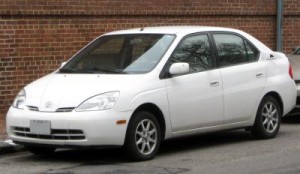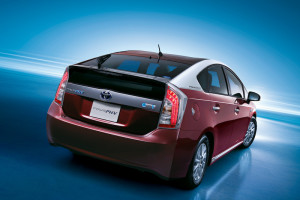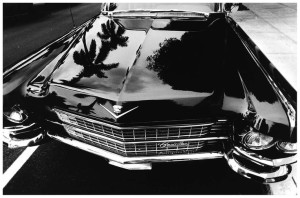-
Q?
Is upgrading my Prius safe?
-
A.
Our upgrades use lithium iron phosphate battery technology. Unlike some of the old lithium battery technologies, lithium phosphate is not prone to thermal run-away. Plug-in kits using the same battery technology have passed rigorous rear-end collision testing approved by the National Highway Traffic Safety Administration.
-
Q?
The dealer says my Hybrid battery is bad and wants over $4,000 to replace it. What should I do?
-
A.
Call us for a 2nd opinion. We can probably repair/replace it for a lot less. If you own a Gen2 Prius we can replace the original (worn out) hybrid battery with our 10k system and upgrade your car to 100MPG in one fell swoop.
-
Q?
My old “Gen1″ (2001-2003) Prius needs a Hybrid battery. Can you help me?
-
A.
 We love Gen1 Priuses. Our service department has tons of experience working on Hybrid batteries, transaxles (transmission), invertors etc. Give us a call before giving up hope on your original classic Prius.
We love Gen1 Priuses. Our service department has tons of experience working on Hybrid batteries, transaxles (transmission), invertors etc. Give us a call before giving up hope on your original classic Prius. -
Q?
I have an old “Gen1″ 2001-2003 Prius or other Hybrid, can I get it upgraded to a Plug-in?
-
A.
Sorry, at this time we are only providing Plug-in upgrades for 2004-2013 Liftback Priuses. However, our service department offers repairs & maintenance on all hybrids at prices substantially less than the dealer.
-
Q?
Who is Boulder Hybrid Conversions?
-
A.
Boulder Hybrid Conversions was founded in August 2010. The four principals came from Evolve Electrics, a Boulder County based EV parts/conversion company and 3Prong Power, a Plug-in conversion business in Berkeley, California. Evolve Electrics has been supplying EV components worldwide for over 3 years, 3Prong Power has been installing Plug-in systems into Priuses since 2007.
-
Q?
What is the Installation Process
-
A.
After we receive a deposit, we schedule your appointment, we need your car for 1-2 days (4kwh systems) or 2-3 days (10kwh systems). We install everything right in our Boulder shop. If you cannot be without a vehicle, there is an Enterprise rental location close to us. We can also drop you at the Boulder bus terminal for coach service to Denver, DIA, and other locations.
-
Q?
Grid Power load and cleanliness?
-
A.
A lot of people say “you’re just using dirty coal generated electricity instead of gasoline so how does it help the environment?” A number of talking points; 1) Electricity always comes from domestic sources. Conflicts in the middle east or oil rigs in the gulf of Mexico are not relevant to electricity production. 2) Most people will charge their Plug-ins overnight. There is plenty of overnight capacity in the current US Power Grid. The US Power Grid can currently support over 100 Million Plug-ins each night without any upgrades whatsoever. 3) In many parts of the country clean, renewable electricity is available. In most parts of Colorado you can pay your utility a few dollars more per month and be guaranteed your energy comes from renewable resources such as WindSource.
Finally, many homeowners install Photovoltaic “solar” panels on their homes to generate their own renewable electricity, locally, on their home to reduce the amount of electricity traveling over transmission lines. 4) Even if your power comes from the average U.S. mix of about 50% coal, your carbon footprint is lower than using gas to power your vehicle..
-
Q?
I heard that Toyota is coming out with their own Plug-in Prius. Why don’t I just wait for their product?
-
A.
 If you don’t currently own a Hybrid, or want the “new car smell” that may be a way to go. You will have to pay for a brand new car ($32k+ taxes fees etc), and the Toyota Prius Plug-in will only have an EV range of 11-15 miles. Our 10kwh system will go around 20-40 miles EV per charge. Financially you are better off to buy a late model Gen2 Prius ($10-15k) and upgrade it. With the money you save you can install some solar panels on your home, reduce your grid demands and round out your green footprint.
If you don’t currently own a Hybrid, or want the “new car smell” that may be a way to go. You will have to pay for a brand new car ($32k+ taxes fees etc), and the Toyota Prius Plug-in will only have an EV range of 11-15 miles. Our 10kwh system will go around 20-40 miles EV per charge. Financially you are better off to buy a late model Gen2 Prius ($10-15k) and upgrade it. With the money you save you can install some solar panels on your home, reduce your grid demands and round out your green footprint. -
Q?
Can I plug in more than once a day?
-
A.
Yes! The more you plug in, the less gasoline you’ll use. Some employers allow Plug-in owners to plug in at work. Let your employer pay for your electricity for the ride home!
-
Q?
What happens if I forget to charge the Plug-in?
-
A.
No problem. You will not be stranded. As long as you have gasoline in the tank (or can find gasoline) your car will operate as a normal Hybrid that day. That is the major benefit of a Plug-in over a pure 100% EV. There is no such thing as “range anxiety.”
-
Q?
What kind of plug/receptacle is required to charge the car? How long does it take? How much does it cost for the electricity?
-
A.
Our systems require a standard 120V, 15Amp, “3 prong” receptacle. If you can plug in a toaster you can plug in your car. No special wiring required. It takes around 3 hours to fill an empty 4kwh system, and around 6-8 hours to fill an empty 10kwh system. Grid electricity for EVs costs around $1/gallon equivalent…even less if you have solar panels on your home.
-
Q?
What is the ROI on the system?
-
A.
The Prius is already very efficient at using gasoline. Our least expensive 4kWh system at about $2,600 after tax credits, will still take many months, if not years (depending on your driving pattern) to “payback” the system. However, the real ROI is non-monetary. if you combine your plug-in system with wind or solar electricity, your electric-only miles are truly zero carbon. Tailpipe emissions will be even less than they are with a “regular” Prius. You’ll also set an example for your children/grandchildren that you can run a vehicle without depending entirely on middle eastern and/or gulf of Mexico oil. There’s also the added convenience of visiting the gas station less often, and a hedge against prices when gasoline increases to $4, $5/gallon or more.
-
Q?
Can I access my spare tire?
-
A.
With the 4kwh system, you still have access to the spare tire. With our 10kwh system We suggest carrying it in cargo area of the trunk on longer trips, or subscribing to a service like AAA or Better World Club (a green alternative to AAA).
-
Q?
Will I lose any cargo space when I upgrade?
-
A.
 The 4kWh system fits in the space below the carpet/deck and above the spare tire, so no visible space is lost. (You do lose the under deck “hidden” black plastic storage bin.) The 10kWh system uses the same area below deck and is about 1 inch taller than our 4kwh system. When the trunk carpet is in place you hardly notice any difference.
The 4kWh system fits in the space below the carpet/deck and above the spare tire, so no visible space is lost. (You do lose the under deck “hidden” black plastic storage bin.) The 10kWh system uses the same area below deck and is about 1 inch taller than our 4kwh system. When the trunk carpet is in place you hardly notice any difference. -
Q?
So I will still use gasoline?
-
A.
At times, yes, but you’ll use a lot less. And when a Plug-in Prius burns gasoline what comes out of the tailpipe is exceptionally clean. Much cleaner than any other gasoline powered vehicle on the road. If you do a lot of “in town” trips and plug in each night you may see remarkable mileage. We’ve had customers go 1,400 miles on 9 gallons of gas. Of course YMMV (Your Mileage May Vary).
-
Q?
When you do an upgrade do you remove the gas engine?
-
A.
It’s important to know that we do not remove the gasoline engine or any of the car’s existing hybrid equipment under the hood. We do not cut any wires, we don’t modify any of Toyota’s software. If the BHC battery pack is depleted or you shut it off the car will perform like a stock Prius. Should you ever want to remove our Plug-in equipment it is easy to return the car back to its original configuration.
-
Q?
100MPG? For real?
-
A.
Actually sometimes you’ll get better than 100MPG. However, there are plenty of variables which impact efficiency. i.e. How many miles a day do you drive? What percentage city vs highway? Do you climb many hills? How fast do you accelerate? Can you “Plug in” more than once a day? How cold is it? With our 4kwh system, most people achieve an average of between 70-80MPG. With our 10kwh system, most people achieve an average of 80-100MPG. Contact us to discuss your particular driving pattern for a better estimate.
-
Q?
Can I upgrade any car to a Plug-in or EV
-
A.
 It is possible, but prohibitively expensive. (at least $20,000 to do a professional Gas car to EV conversion) Prius Hybrids already have electric motors that can propel the car. It is much easier to upgrade a Prius to a Plug-in than convert a 100% gasoline vehicle. At this time BHC only upgrades 2004-2013 Toyota Prius Hybrids.
It is possible, but prohibitively expensive. (at least $20,000 to do a professional Gas car to EV conversion) Prius Hybrids already have electric motors that can propel the car. It is much easier to upgrade a Prius to a Plug-in than convert a 100% gasoline vehicle. At this time BHC only upgrades 2004-2013 Toyota Prius Hybrids. -
Q?
What vehicles can be upgraded?
-
A.
We are currently offering systems for 2004-2013 liftback model Priuses.
-
Q?
How much does it cost?
-
A.
Our 4kwh system are around $10,000 installed. For Colorado residents this is around $2,600 after state tax credits. Our 10kwh systems are under $12,750 installed. For Colorado residents this is around $5,600 after state tax credits.
-
Q?
Does a conversion void my warranty?
-
A.
The Magnuson-Moss Warranty Act prohibits Toyota from voiding their warranty, unless they can prove that any retrofits directly affected the item in dispute. Our retrofits do not inhibit or damage any stock components, so Toyota should honor their warranty. In the event Toyota does not honor their warranty, Boulder Hybrid Conversions’ warranty covers those components (see our warranty for details). Our sister company in California (3Prong Power) has never had a customer denied warranty coverage in almost 4 years of operations.
-
Q?
What do the terms mean; BEV, EV, PHEV, PHV ?
-
A.
EV means Electric Vehicle. BEV refers to Battery Electric Vehicle, essentially the same thing as an EV. PHEV stands for Plug-in Hybrid Electric Vehicle, a hybrid that can also have its battery pack charged by plugging it into the wall. PHV means Plug-in Hybrid Vehicle, essentially the same as PHEV.
A Plug-in Hybrid allows you to drive your car on gas or electricity. It’s like your car has two fuel tanks: one for gas and one for electric energy. You can fill your gas tank at any gas station like you would for a regular car and you can fill your electric tank by plugging your car into a standard 120V “three prong” electric outlet. Using the electric tank is much less expensive and better for the environment. You get the benefits of an electric car around town, and a gas (hybrid) car on longer trips. The Prius often runs in “blended mode” using a mixture of battery power and gas.
-
Q?
Where can I get more information from the state of Colorado?
-
A.
FYI Income67 — Current version
General Information about Plug-In Hybrids
-
Q?
I want to wait a few months and see how things go.
-
A.
No problem, but if you have your car upgraded to a Plug In before the end of 2013, you’ll get your refund around April 2014. (assuming you file taxes on time). If you do the conversion in 2014 you’ll have to wait until around April 2015 for your rebate.
-
Q?
What happens if the state “Pulls the plug” (pun intended!) on this program?
-
A.
No future upgrades will be eligible. It is anticipated the tax credits will last until at least the end of 2013 and even longer. However, the rebates are planned to decrease starting Jan 1, 2014. We encourage you to do the installation sooner than later.
-
Q?
How do I apply for the tax credit?
-
A.
Forms will be available from state tax agencies as we get closer to tax season. You will need to include a copy of the BHC invoice and your vehicle registrations.
-
Q?
What is the real deal?
-
A.
You have to purchase the system and pay BHC at time of installation. At “tax time” you get 75% on the balance (max $7500) from the state of Colorado. BHC accepts major credit cards and can put you in touch with a local financial institution if you wish to finance your purchase.
-
Q?
Can I convert more than one Vehicle?
-
A.
Yes, if you have more than one Prius in your household, convert all of them for even more savings!
-
Q?
What vehicles are eligible?
-
A.
Right now we have two products (4kwh and 10kwh for 2004-2009 aka “Gen2″ Priuses. Our 4kwh product for 2010-2013 “Gen3” (Liftback model only) is also available now. Our 10kwh product for Gen3 Prius will be available in the fall of 2013. At this time we have no plans to support other vehicles.
-
Q?
Who is eligible to receive Colorado Tax Credits?
-
A.
You must be a Colorado taxpayer and have your car registered in Colorado. Even if you don’t owe money to the state at tax time, you will get a refund (Yes, the state will send you a check!)
Full official information about the 2013 tax credits/refunds will be available by June 2013 and/or consult a CPA/tax professional.
